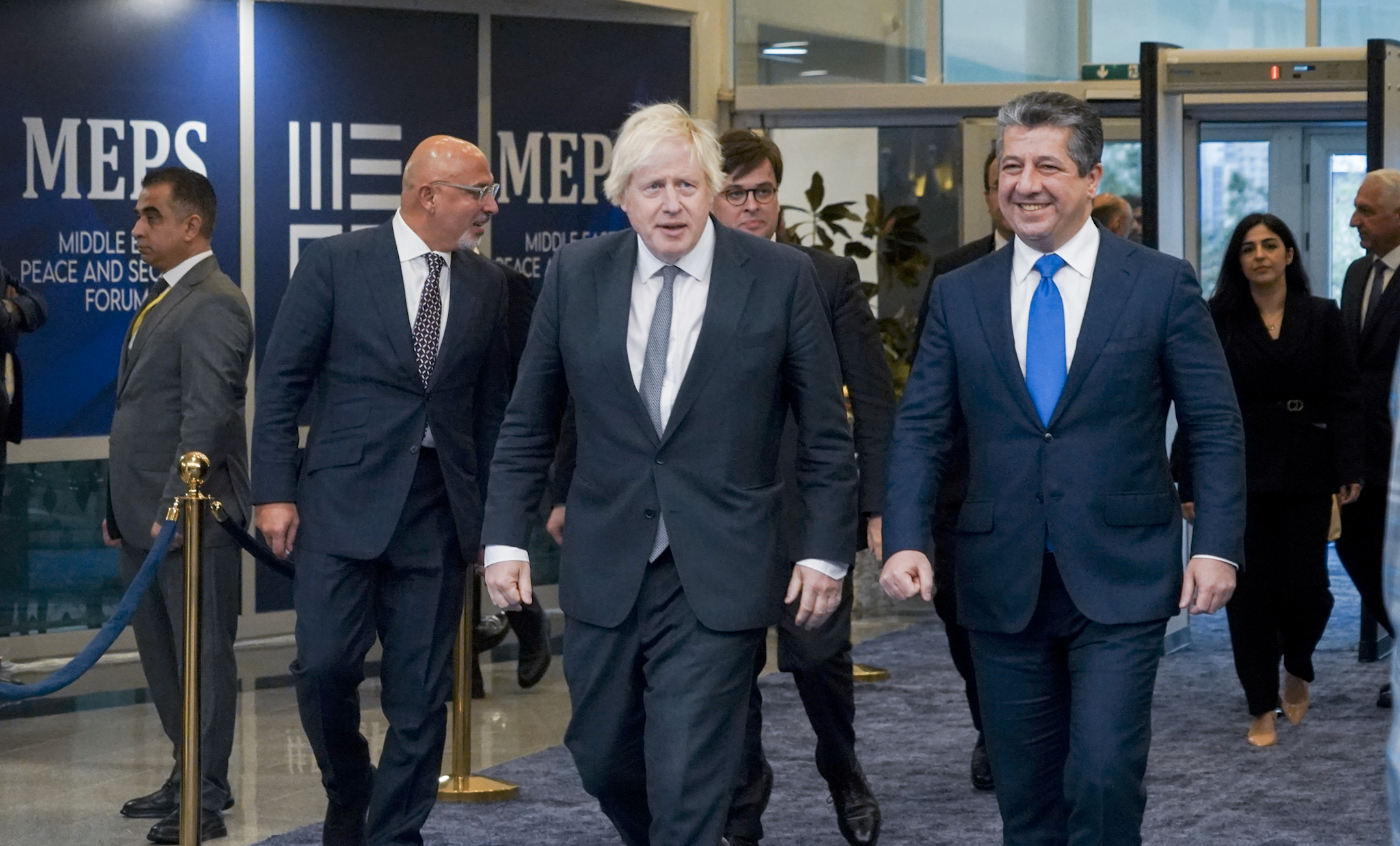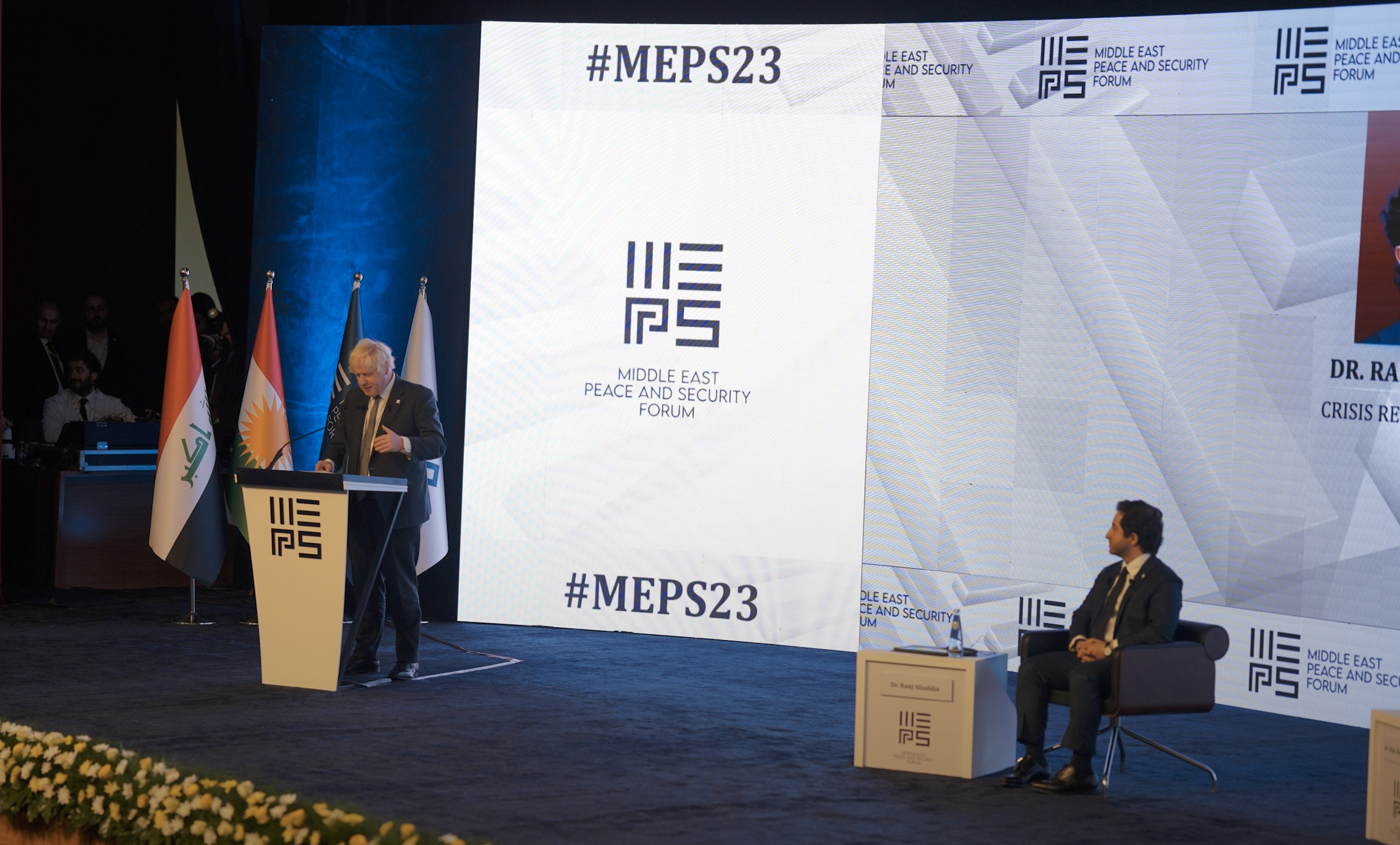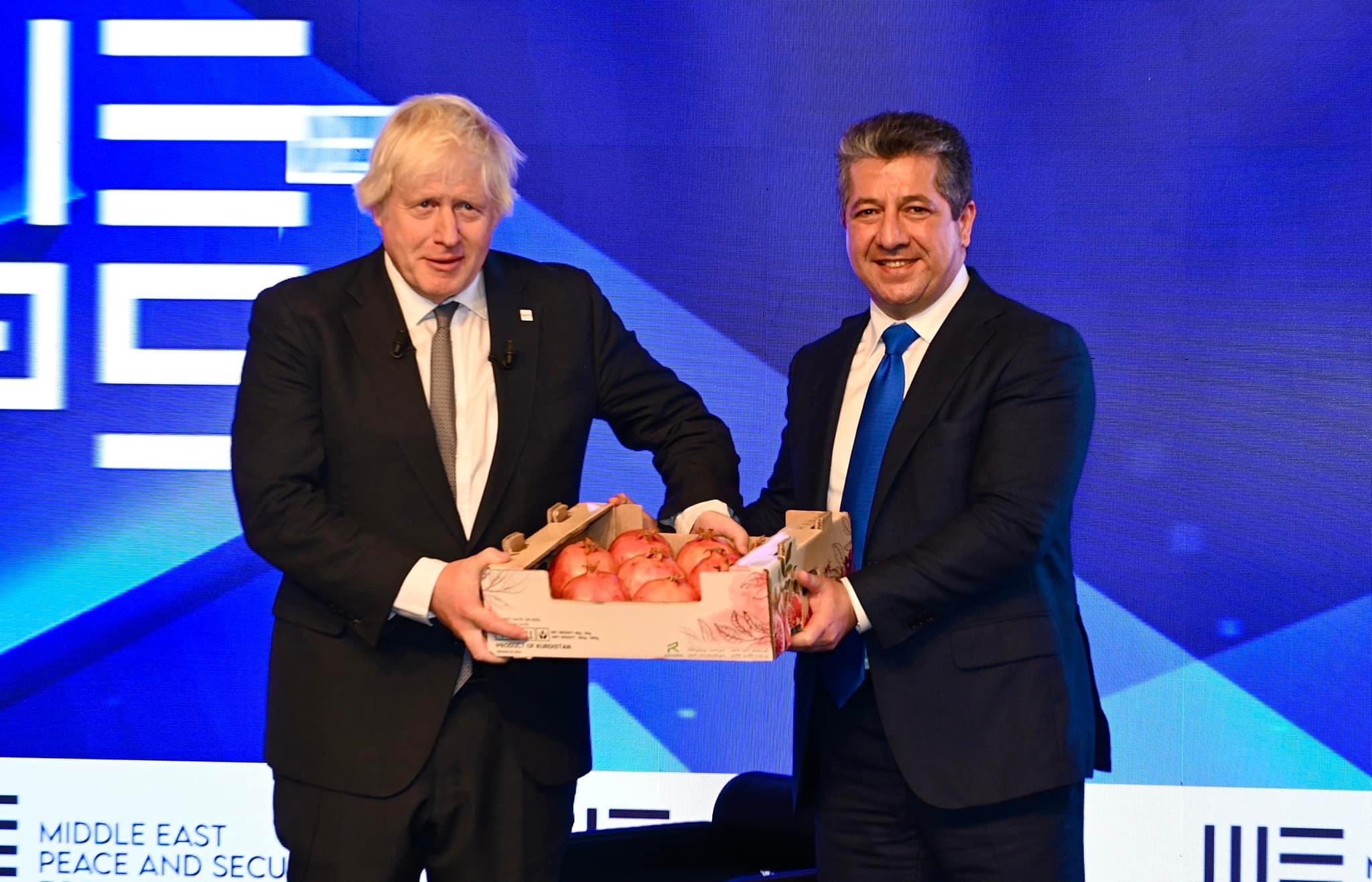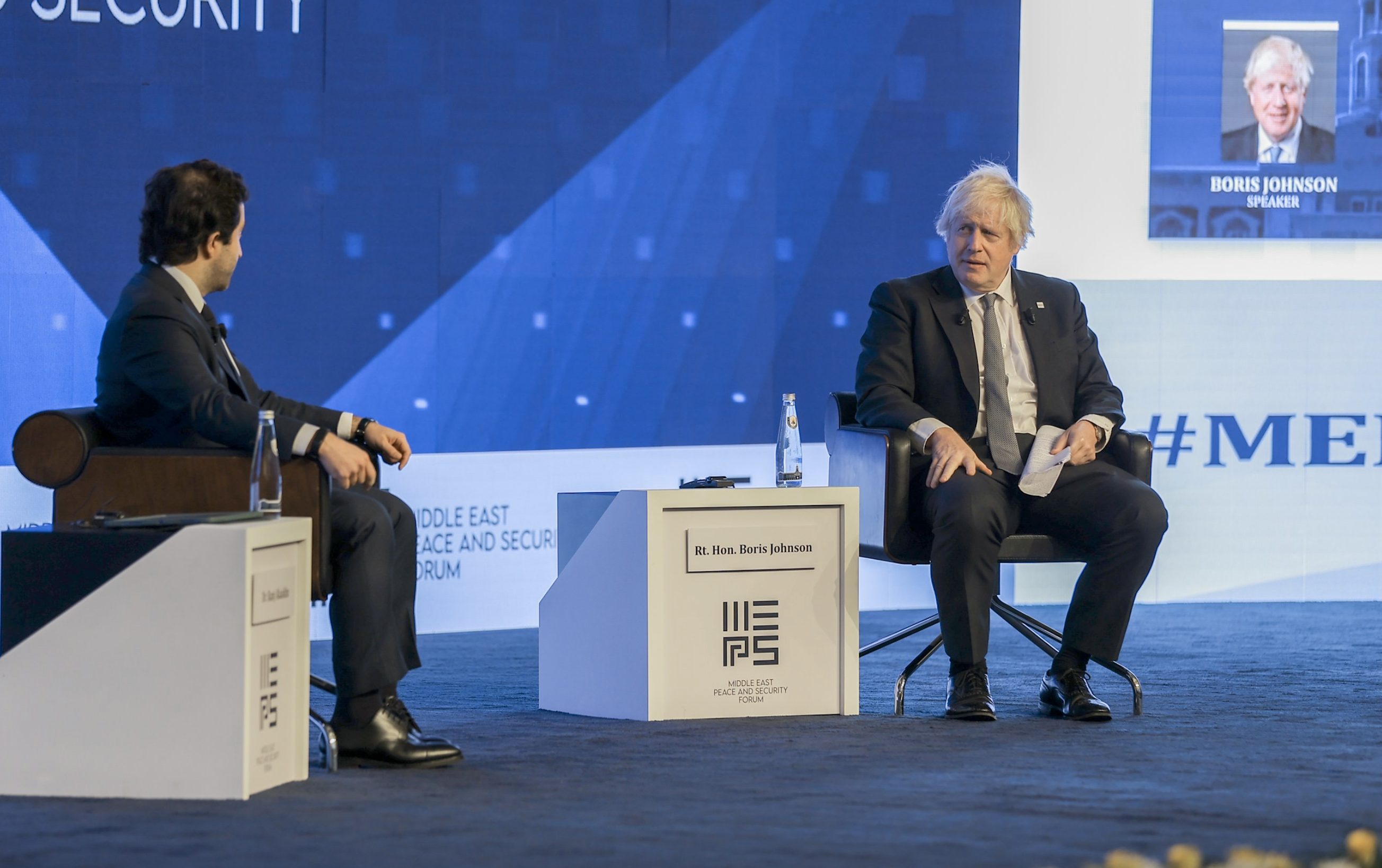In November, Boris Johnson, the former British Prime Minister, took part in the Middle East Peace and Security (MEPS) Forum 2023 in the Kurdistan Region. The event, hosted at the American University of Kurdistan in Duhok, saw Johnson leading a panel discussion and delivering a speech. His presence highlighted his commitment to the Kurdistan Region, emphasizing the significance of multilateral dialogues in addressing the intricate challenges facing not only the Kurdistan Region but also the broader Middle East and the world. During his speech and subsequent discussion with Ranj Alaadin, Johnson reflected on his 2015 visit to Kurdistan as the Mayor of London, coinciding with the peak of the war against ISIS. He also discussed his efforts to advocate for Kurdistan during his tenure as the UK's Prime Minister.

Solidarity then and now
In his opening address, Johnson reminisced about the reasons behind his trip back in 2015, citing the threat of terrorism that he felt was present in the UK – and London in particular – as well as in the KRI. “In London, we were facing the same challenge from people who were infected by the same nihilist ideology (as ISIS) and killing innocent people in appalling terrorist attacks, bombings, and stabbings,” he said.
The former prime minister underlined the significance of the peshmerga’s battle against ISIS, emphasizing that it was not merely a regional conflict but a collective struggle against a common enemy. “Young Londoners were even going to Iraq and Syria to join this evil death cult ISIS. They were being radicalized by these people in their rooms at home in the UK, so your fight was our fight, and your war was our war,” he said.
Johnson also recounted a moment when, against the advice of his advisors in the UK Foreign, Commonwealth and Development Office, he posed with an AK-47 during a visit to a military camp near Erbil. This symbolic gesture aimed to express his support for the peshmerga’s mission and his shared commitment to overcoming the challenges posed by ISIS. “I want to express my deepest gratitude once again. I want to extend my heartfelt thanks for your heroism, the heroism of the Kurdish armed forces, the peshmerga.”
The 2015 visit thus formed an enduring bond between the UK and the Kurdish people that continues today, underscoring how the fight against terrorism, and for human rights and economic freedom, transcends borders and requires collaborative efforts from the international community.

Economic freedom and progress
Johnson then turned to a discussion of global uncertainties both political and economic, arguing that the collective defense of the fundamental values of freedom, democracy, and human rights were under threat from those willing to commit atrocities against innocent people. He reflected on how the atrocities committed against the Kurds in 1991, among other such tragedies, had prompted the British government under John Major to propose the creation of safe havens, which was a vital step for the KRI to emerge today as a defender of the values that he shares and a growing, open economy. “I think it’s really grown from then and it’s incredible for me to come here and see modern Kurdistan, to wake up in an absolutely colossal hotel room, so big that I couldn’t find the bedroom.”
Johnson highlighted other economic successes, including the proactive reforms – most notably in digital banking – that Kurdistan Regional Government Prime Minister Masrour Barzani has advanced.
Referencing the ongoing challenges for Erbil in navigating its relations with Baghdad, Johnson emphasized the importance of fair solutions that respect the rights and aspirations of the Kurdish people. “Any excessive attempt to centralize and not to respect those rights will only be deeply counterproductive, so it’s vitally important that we stick up for the rights of Kurdistan and its economic freedom,” Johnson said.
Again, Johnson reminisced about his 2015 visit, when he had visited the showroom of the British car company Jaguar and, to market the company’s Land Rovers, drove one out into Erbil traffic against the recommendations of his security detail. The progress between then and now was staggering. “There are now more than 200 British companies doing business in the KRI, and our trade is up 83% year-on-year,” Johnson highlighted, also mentioning the sale of 22 tons of pomegranates to the UK last year.

The future of Kurdistan
Following his speech, Johnson fielded a series of questions from Ranj Alaaldin, the director of Crisis Response Council and a former foreign policy analyst at the Brookings Institution, regarding the challenges confronting the Kurdistan Region of Iraq (KRI) within the framework of global politics. In this segment of the program, Johnson highlighted the unfavorable legacy of Western involvement in Iraq, particularly critiquing the ill-advised decisions to intervene in 2003 and subsequently withdraw in 2011. He also discussed the repercussions of the West's subsequent shift in focus towards Asia.
Yet, expressing a preference for U.S. leadership over other potential global hegemons like China or Russia, Johnson posed the question of how to get the United States to assume its responsibilities more eagerly. “We’re seeing an America that is not willing to to act, and a failure of leadership or an absence of leadership is worse sometimes than firm leadership. All human institutions involve a leader, and global politics is no exception.”
In light of China’s expanding presence in the KRI and the Middle East, Johnson expressed a preference that the United States and its Western allies engage with China rather than divide into a polarizing cold war, as the two blocs are linked like “Siamese twins.” Nevertheless, he urged the region to continue to court Western investment rather than “commercial dependency” on China.

In this context, Johnson highlighted the KRI’s commitment to advancing green energy and technologies through programs and initiatives, which Prime Minister Barzani also emphasized in his introductory remarks. “The commercial benefits of going green and switching to renewable technologies, with all the jobs that they can create, is fantastic.”
As a closing question, Johnson was asked whether he would recognize an independent Kurdish state, in the hypothetical scenario in which he becomes prime minister once again. After another dose of characteristic humor, in which he said that the possibility of his re-election was as likely as him being reincarnated as an olive, Johnson said, “I’m going to be backing Kurdistan for the reasons I outlined today. Irrespective of the path that Kurdistan chooses, you have our support in the UK, and the constitutional issues within Iraq need to be properly resected to represent your legitimate aspirations.”
“If I have one message to convey today, it is this: the UK, as long as I have anything to do with it and beyond, will steadfastly stand by Kurdistan,” Johnson said.